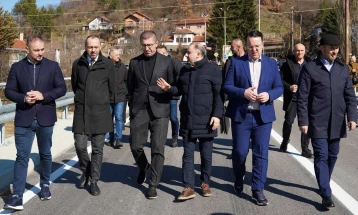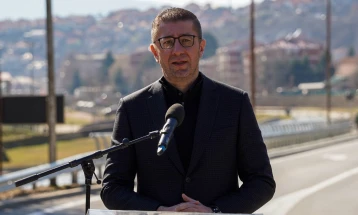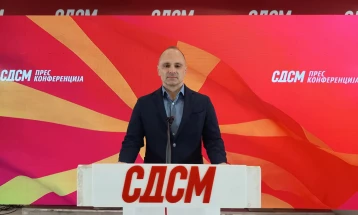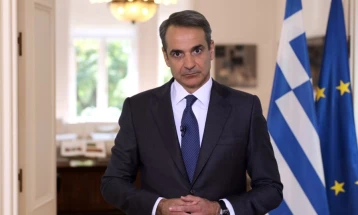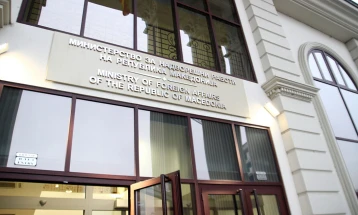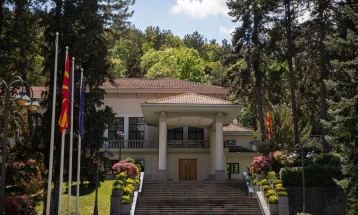Ruling party says country ready to open first Cluster and constitutional changes shouldn't be delayed, opposition sees weak reforms as problem
- The National Euro-Integration Council and the Committee on European Affairs held a joint session in Parliament on Wednesday, discussing the draft-Roadmap on the Rule of Law and the draft-Roadmap on Public Administration Reform.
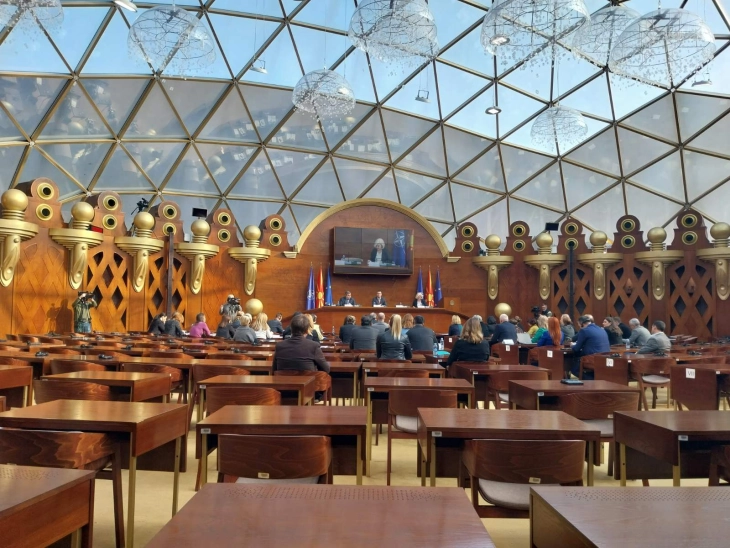
Skopje, 19 December 2023 (MIA) - The National Euro-Integration Council and the Committee on European Affairs held a joint session in Parliament on Wednesday, discussing the draft-Roadmap on the Rule of Law and the draft-Roadmap on Public Administration Reform.
Deputy PM for European Affairs Bojan Marichikj pointed out that the two documents stem directly from the screening process which was successfully completed in November, adding that the opening of the first cluster is conditioned on the two documents.
This whole process, since the beginning of the negotiations in July 2022, has been a continuation of all the work invested in the previous ten years in order to reach this key point which should open the first cluster. The success of the screening process, he added, was due to intensive work of about 100 working days, engagement of over 1,000 participants from 200 different institutions who prepared 850 presentations during the screening process.

"In preparing all the documents, our administration took into account the screening report on Cluster 1, the country's Progress Report which was also discussed with these bodies in the Parliament, where together with the EC we tried to address the biggest shortcomings in key areas and put them in the form of goals and tasks for the next 6-7 years period until 2030 when we expect to complete the accession negotiations. In parallel, we are in coordination with the Ministry of Foreign Affairs and other institutions for the drafting of the Action Plan," said Marichikj.
The Roadmap on the Rule of Law includes key areas from Chapter 23 - Judiciary and fundamental rights, and Chapter 24 - Justice, freedom and security, as well as Action Plan measures as an accompanying document.
"Priority areas in Chapter 23 are judiciary, fight against corruption and fundamental rights, and we are aware that the most difficult tasks, particularly following the report of the EU peer review mission on the Judicial Council, should be precisely in these areas if we want to build the rule of law that will surely walk the path towards full-fledged membership. The strengthening of the independence of the judiciary and the prosecution as well as the continuous implementation of the legislation and the implementation of an appropriate track record - i.e. report on the implementation of the laws, including the rules for the appointment of judges and public prosecutors based on merit, promotions, the procedures for disciplinary responsibility and dismissal, which should exclusively be based on objective criteria, and the goal should be to achieve them with the measures provided in this area. The fight against corruption is also one of the priorities in the roadmap, and the measures are aimed not only at strengthening the existing legislative framework, but also strengthening the position of key institutions, their capacity and their operational possibilities," Marichikj pointed out.

Chapter 24 includes seven priority areas that are part of the roadmap, namely: fight against organized crime, cooperation in the fight against drugs, fight against terrorism, judicial cooperation in civil and criminal matters, migration, asylum and visa, foreign borders within Schengen borders, fight against counterfeiting of the euro, etc.
On the draft-Roadmap on Public Administration Reform, Marichikj noted that the basis is the Public Administration Reform Strategy 2023-2030, which includes four priority areas - development and coordination of policies, management of the public service and human resources, responsibility, accountability and transparency, and delivery of services and digital transformation. Measures are aimed at a depoliticized, efficient, effective and responsible public administration that provides high-quality policies and easily accessible services to citizens.
As regards the Growth Plan for the Western Balkans, the Deputy PM for European Affairs said it is based on four pillars and is a response to requests to provide some benefits for the citizens before joining the EU, adding that it should contribute to strengthening the reforms in the area and double the economy in the region in ten years.
"One of the obligations arising from the plan is for each country to prepare a reform agenda with an indicative list of priorities that will represent a coherent package of measures to achieve the intended goals for the reforms planned for the next four years. The implementation of these reforms will be the basis for receiving the funds from the Growth Plan," said Marichikj.
In parallel, the Secretariat for European Affairs in coordination with the Ministry of Foreign Affairs has started drafting an Action Plan to protect and promote the rights of persons belonging to minorities and communities, which should be seen in correlation with the roadmaps, primarily that on the rule of law.
"From the very beginning, our administration is in constant communication with the services of the European Commission, in order to reach a mutually acceptable document, which should then be accepted by the member states," Marichikj said.
National Euro-Integration Council chair Aleksandar Nikoloski pointed out, among other, that the Growth Plan is a good mechanism proposed by the EU, and the state should use the funds in order to stimulate growth and work more intensively on improving the infrastructure, both road and rail, communications, digitization, as well as on giving a chance to the private sector. However, he noted, the state cannot boast of reforms in the area of the rule of law, and the main reason why the country did not start EU accession negotiations is the high level of crime and corruption.
"We don't have a problem with the strongest EU member state, we have a problem with the weakest or the second-weakest EU member state. Bulgaria needs the EU much more than the EU needs Bulgaria, and there are appropriate mechanisms with which the EU itself, but also the member states can put pressure on Bulgaria if they are convinced that Macedonia deserves the start of negotiations, but unfortunately, several large member states are not convinced that Macedonia deserves the start of negotiations, primarily because of the high level of crime and corruption and the lack of a functional rule of law system," said Nikolovski.
According to him, after the next parliamentary elections, he is convinced that the country has well-established institutions and good legislation, but there should be only professionals working in the institutions and results will be seen in just six to nine months.
According to Chair of North Macedonia's Parliamentary Committee on European Affairs, Arber Ademi, the European Council conclusions clearly state that the EU is ready to complete the opening phase of the accession negotiations with North Macedonia as soon as it has implemented its commitment to complete the constitutional changes.
"We can open various debates about the situation with the fight against corruption, but the only condition is the constitutional amendments. Allow me to disagree with the thesis that there should be no haste in adopting the amendments. On the contrary, such a thesis is disastrous for us. We should bear in mind that the Russian military aggression in Ukraine reinvigorated the enlargement process. The EU openly suggests membership of new states by 2030, and we should be ready, adopt the constitutional amendments and show the will that we are in favor of EU membership," said Ademi.
According to him, there is not a single reason to delay the constitutional amendments, regarding which there is no evidence that they will have a negative outcome for the country.
"One gets the impression that the upcoming elections are more important to us than the future of young people, our responsibility, which we cannot run away from. Citizens are waiting for new perspectives for the country, and we need to open a path for them towards EU membership," Ademi said.
Photo: MIA

